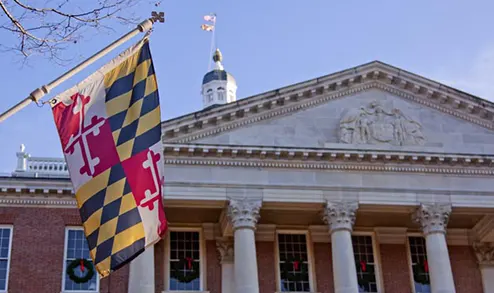 A pair of legislative efforts seeking to improve responsible gambling practices and ensure customer protection in the state were approved on the state legislature’s final session day this Monday. The two bills are now awaiting Governor Wes Moore’s signature. If approved, Senate Bill 620 and House Bill 802 would limit partnerships between colleges and sportsbooks. The other legislative effort aims to audit handicappers and touts in the state. But industry experts claim that the measures may turn out to be not so efficient.
A pair of legislative efforts seeking to improve responsible gambling practices and ensure customer protection in the state were approved on the state legislature’s final session day this Monday. The two bills are now awaiting Governor Wes Moore’s signature. If approved, Senate Bill 620 and House Bill 802 would limit partnerships between colleges and sportsbooks. The other legislative effort aims to audit handicappers and touts in the state. But industry experts claim that the measures may turn out to be not so efficient.
Maryland to Restrict College Partnerships with Sports Betting Operators
SB 620 and HB 802 seek to prohibit colleges from entering into partnerships with betting companies. The two legislations do not explicitly ban such deals, but only a specific element associated with them, and more precisely partnerships under which a sports marketing entity or another institution of higher education receives compensation for a student who participates in certain sports wagering activities.
Under the provisions of the bills, details of contracts between sportsbooks and universities must be made public. But it is unclear whether this applies to the partnership between the University of Maryland and PointsBet as the legislation would be enacted after the deal was sealed.
A series of articles in the New York Times inspired Sen. Shelly Hettleman to create SB 620. One of the said articles even made PointsBet and the University of Colorado end their partnership as it was revealed that the latter received financial compensation for customers who used a specific promotional code sent to the university when registering with PointsBet.
At the end of March this year, the American Gaming Association announced that it no longer allows the gambling industry to partner with colleges to promote gambling activities.
Maryland’s Sports Handicapper Audit Bill
Sponsored by Senators Craig Zucker and Shelly Hettleman, SB 621 seeks to permit the Maryland Lottery, the authority in charge of sports betting in Maryland, to hire independent auditors to examine sports betting handicappers and look into their records. The objective of the bill is to remove shady touts from the sports betting industry.
Although the logic behind the legislative effort is clear, industry insiders believe that the legislation will be useless because Maryland’s licensed sportsbooks are reputable and are unlikely to provide misleading sports betting content. Besides, the Maryland Lottery can penalize operators caught violating the law. Another fact that makes the bill inefficient is that shady touts operate outside regulated markets and use social media to attract followers. Thus, independent evaluators may appear to be powerless against touts who provide misleading content.